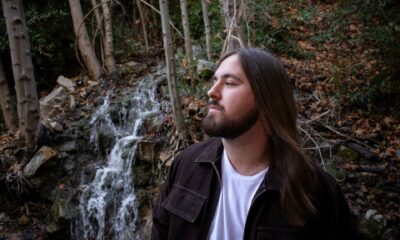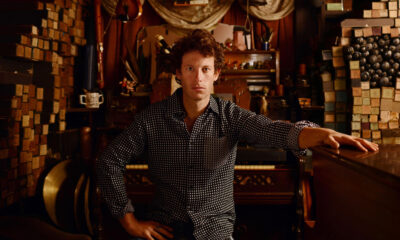Interviews
Throwback Thursday Interview with Chris Shiflett of Foo Fighters and Dead Peasants

Conducted on Wednesday June 21, 2010
By: Alex Young
http://www.myspace.com/chrisshiflett
Guitarist Chris Shiflett has taken on multiple musical personalities over the past two decades, playing for No Use For a Name, Jackson United, Me First and the Gimme Gimmes, and the Foo Fighters. And he has shifted gears yet again while the members of the Foo Fighters pursue various side projects with Them Crooked Vultures, as well as Taylor Hawkins and the Coattail Riders.
Instead of waiting in the wings for the band to get back together, Shiflett has forged his own musical project called the Dead Peasants. The self-titled album is hitting shelves this month and with a solid line-up behind him, Shiflett is getting ready to take his tunes on the road.
Lithium Magazine was given the chance to chat with Shiflett about the inspiration behind his songs, how he turned this studio project into a full-fledged band, and his relentless love for rock and roll.
Alex: When did you realize The Dead Peasants wasn’t just an idea you wanted to keep on the back burner and was ready to become a full-fledged project?
Chris: It sort of evolved over time. I had an earlier group of guys, an earlier version of this thing, we played a few shows and that kind of inspired me to write the songs on the record. That came together over a couple of years or so, and when we went into the studio to actually make the record I didn’t have a band together. It wasn’t like a band going into the studio with all their songs worked out and ready to go. I was just me and my friend Lou (John Lousteau, house engineer and drummer at 606 Studios); we got all the basic stuff together then all these different people came and played bass and pedal steel and whatever. Now that we’re touring, I’ve gotten a band together. It never really came down to one specific moment where it was like, ‘I want to do THIS now’. I’m lucky. Years ago we, the Foo Fighters, built the studio.
Alex: Yeah, 606.
Chris: Studio 606, yeah. So we have that and we own it, that’s where we rehearse and make records. When we’re not using it, all of us go in there with our other bands and projects and record. It’s really a great thing, I can go in there and not stress about time, have a nice easy pace and that’s what we did for this.
Alex: Well, I suppose it’s a lot more organic that way.
Chris: Yeah, I think so.
Alex: That’s awesome. What was it like to play with an ensemble cast of musicians rather than a core group of people? Especially when it’s people who have played with Beck and Weezer, Wilco, and get them all under one roof together?
Chris: That was the crazy thing, we never got them under one roof together, they all filed through one by one. It was really cool, I’ve never made a record like that but it was a great way to do it.
Alex: How did the experience of creating the Dead Peasants as one of your musical identities differ from playing with the Foo Fighters or Jackson United or Me First and the Gimme Gimme’s?
Chris: Each one of them is a different set up. Everybody knows that Foo Fighters is Dave’s band (Dave Grohl – lead singer, formerly of Nirvana and currently in Them Crooked Vultures) My role in the Foo Fighters is a very different thing. I’m the guitar player so I play what Dave wants me to play. I’m not the one writing the songs and leading the charge, it’s a different kind of role. The Gimme’s is more of a democracy in a way; we all have our say in that.
Alex: What was the transition like, from playing a role in a band to taking charge?
Chris: Well, I feel like those records prepared me for this record in a way. If I hadn’t done those records I wouldn’t have been able to do this record because it was sort of a more realized version of the same process.
Alex: Everywhere I’ve read that critics called this a country album, but when I reviewed it I thought it was more like a rock album with elements of country sprinkled through it.
Chris: I would agree with your assessment. It’s tough, because with labels it is country or Americana? But to me, I’m a guy that grew up on rock and roll and I have a love and appreciation for a lot of country music and music influenced by country music. (Shiflett listed Waylon Jennings, Johnny Cash and Hank Williams as three of his biggest influences on his website) If you have a little pedal steel on your album it’s easy to say, ‘This is an Americana record’. But when you think of Americana you don’t think of country records or guys who grew up listening to KISS trying to play country music.
Alex: Yeah, exactly. I’ve listened to classic country music like the Highwaymen and Johnny Cash and I thought that element of the music bled through on this record. The songs are spoken from a very personal place because it focused more on. It was more reflective and hopeful instead of focusing on what was lost. Do you feel that helped the album become more of a rock and roll record.
Chris: Lyrically, I always write from personal experiences. I have a lot of respect for guys that can write great third person narratives but that’s never been something I’ve been real comfortable in. I’ve never really even tried it. It all comes from personal experience and I’m always interested in how other people analyze my lyrics and that’s nice to hear
Alex: My pleasure, I really enjoyed the album a lot. I wanted to ask you about “Atheist’s Prayer” and where the inspiration for that track lifted off?
Chris: Musically it was inspired by Mick Taylor era Stones, that’s the sound I was trying to go for with that. Lyrically, it was inspired by a guy I knew who killed himself out of the blue. It was just a strange experience because it wasn’t someone I was super close to but somebody I’ve been around a lot. It was inspired by that feeling because it caught everyone by such complete absolute surprise.
Alex: Yeah, exactly. Not too draw myself in too close, but something like that has happened to me before. When I heard that song it made me think that some people don’t appreciate everything or everyone they have in their life until they’re in a crisis point.
Chris: Yeah, that’s exactly right.
Alex: That song, in particular, just stuck out in my brain. I really liked the song “Bandaged”, where did that whole conundrum come from?
Chris: That was one of the early songs that I wrote for this thing. When we first worked it out, my friend Lou (John Lousteau) who played drums on this thing was like, ‘That’s the direction we should go in’. It was at an early stage when it was still kind of up in the air about what the record was going to be and we were still working out the songs.
Alex: Yeah, like it kind of laid the groundwork for the rest of the album and gave you guys a goal to work towards?
Chris: Exactly.
Alex: That’s great. Thanks a lot for taking the time out to talk, man.
Chris: No problem buddy. Take care.
-

 Music6 days ago
Music6 days agoTake That (w/ Olly Murs) Kick Off Four-Night Leeds Stint with Hit-Laden Spectacular [Photos]
-

 Alternative/Rock18 hours ago
Alternative/Rock18 hours agoThe V13 Fix #011 w/ Microwave, Full Of Hell, Cold Years and more
-

 Alternative/Rock1 week ago
Alternative/Rock1 week agoThe V13 Fix #010 w/ High on Fire, NOFX, My Dying Bride and more
-

 Features6 days ago
Features6 days agoTour Diary: Gen & The Degenerates Party Their Way Across America
-

 Culture1 week ago
Culture1 week agoDan Carter & George Miller Chat Foodinati Live, Heavy Metal Charities and Pre-Gig Meals
-

 Music1 week ago
Music1 week agoReclusive Producer Stumbleine Premieres Beat-Driven New Single “Cinderhaze”
-

 Indie18 hours ago
Indie18 hours agoDeadset Premiere Music Video for Addiction-Inspired “Heavy Eyes” Single
-

 Alternative/Rock2 weeks ago
Alternative/Rock2 weeks agoThree Lefts and a Right Premiere Their Guitar-Driven Single “Lovulator”













